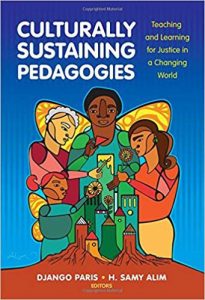 On Tuesday, September 3, a new cohort of graduate students flooded into Bank Street’s halls for their first day of the 2019-20 school year. After a full day of orientation activities, the Graduate School held its annual Barbara Biber Convocation, the centerpiece of orientation and an annual opportunity for the College community to engage with seminal scholars on leading issues in education.
On Tuesday, September 3, a new cohort of graduate students flooded into Bank Street’s halls for their first day of the 2019-20 school year. After a full day of orientation activities, the Graduate School held its annual Barbara Biber Convocation, the centerpiece of orientation and an annual opportunity for the College community to engage with seminal scholars on leading issues in education.
This year, the convocation featured educator and researcher Django Paris, who led a presentation titled, “Joining Communities in Culturally Sustaining Teaching & Learning.” With remarkable eloquence and insight, Paris shared his vision of how to teach for educational and cultural justice in a changing world. Paris is the inaugural James A. and Cherry A. Banks Professor of Multicultural Education and director of the Banks Center for Educational Justice in the College of Education at the University of Washington.
Paris began by introducing the importance of land acknowledgment, a term that recognizes and respects Indigenous Peoples and their enduring relationship with their traditional territories. A concept highly valued by Paris, land acknowledgment is a theme explored at the start of his syllabus each year to help his classes build toward a shared understanding of culturally sustaining pedagogies.
 His lecture followed a similar format. After reminding us that we—and the institutions of higher education we study in—exist on indigenous land, Paris pioneered a discussion on how we can approach teaching in a way that celebrates how students engage with culture. He referenced those who have inspired his own journey as an educator, including Favianna Rodriguez, whose artwork was featured on the cover of Paris’s book, Culturally Sustaining Pedagogies. The cover shows a diverse group of people of all ages each holding an object to add to their community space.
His lecture followed a similar format. After reminding us that we—and the institutions of higher education we study in—exist on indigenous land, Paris pioneered a discussion on how we can approach teaching in a way that celebrates how students engage with culture. He referenced those who have inspired his own journey as an educator, including Favianna Rodriguez, whose artwork was featured on the cover of Paris’s book, Culturally Sustaining Pedagogies. The cover shows a diverse group of people of all ages each holding an object to add to their community space.
“This piece could really be a conceptual framework for thinking about what culturally sustaining education is and can be,” said Paris. “The idea that we’re building the world we need is something I hope we can take to heart as educators.”
In his presentation, Paris also conveyed the urgency around leaving behind “deficit approaches” in the classroom and shifting toward “strengths and asset approaches.” These approaches respect community language, literacies, histories, and cultural ways and see them as strengths instead of weaknesses or challenges. According to Paris, approaching pedagogy in this way can transform learning spaces and systems and enrich student learning.
At several points in the lecture, Paris created the space for the audience to do some of their own reflecting. In one activity, Paris asked guests to “think about how Native, Black, Latinx, Asian, and Pacific Islander students and communities were positioned in your own education and how they are positioned in your school and classroom now.” Students deliberated with their new classmates and peers.
The lecture inspired the audience with the important message that we need to maintain a sense of community in our classrooms and school systems. Following the lecture, guests had the opportunity to mingle with their new classmates and teachers in the lobby over snacks and refreshments.
“Django Paris inspired us with sharp insight into how culture can empower our students and open up deeper opportunities for learning,” said Cecelia Traugh, Dean, Graduate School of Education. “His values echo Bank Street’s commitment to understanding the impact of bias and supporting culturally-responsive, strengths-based learning. We are thrilled that our students had the chance to hear from him.”
The Barbara Biber Convocation recognizes the contributions of Barbara Biber to Bank Street and the wider educational community. Dr. Biber was a central figure shaping the institution that evolved from the Bureau of Educational Experiments to become Bank Street College. A keen observer of children and classrooms who immersed herself in the phenomena of children’s’ and teachers’ lives, her writings achieved a rare depth of insight and conceptual elegance. As a researcher and scholar, she continuously reexamined and refined her thinking. This lecture memorializes her progressive legacy.